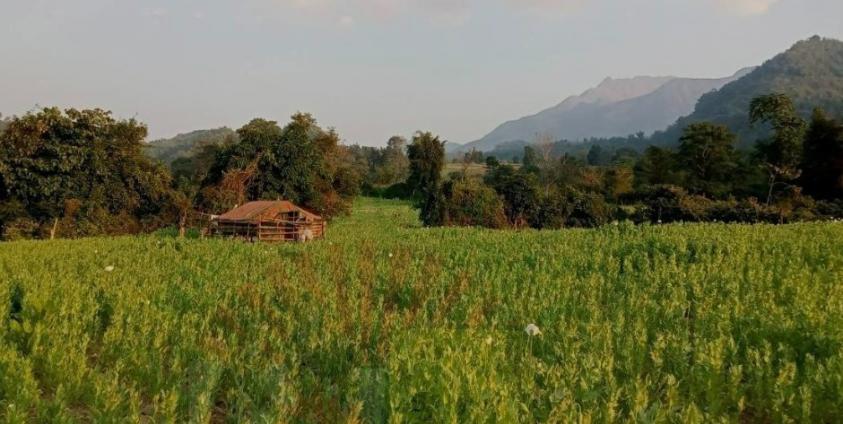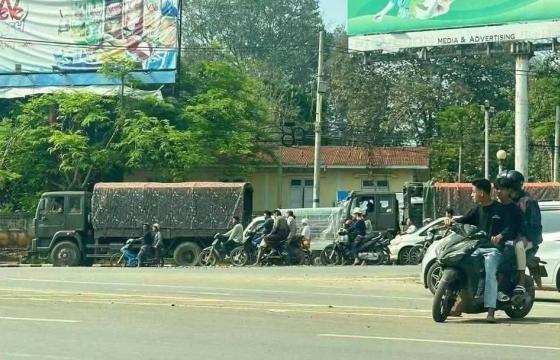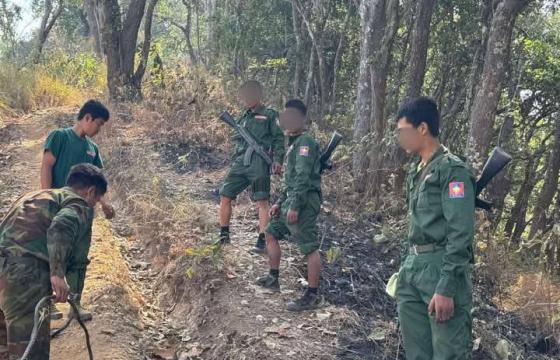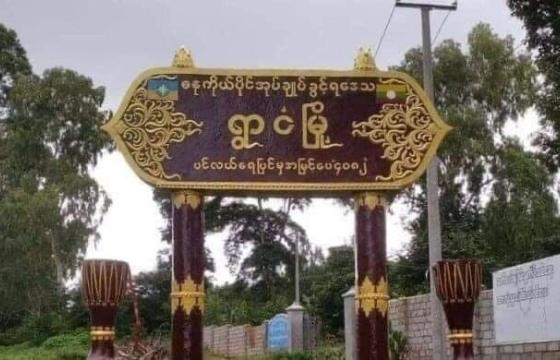Among the mountains, very beautiful colorful flowers are blooming like a flower garden. If you look at it from a distance, you might think it's a colorful flower. But those are poppy fields, not flower gardens.
The poppy plantations that seem to be colorful flowers are located in Tangyan Township in northern Shan State. It is almost a two-hour drive from Tangyan by motorbike, and the road is rough and difficult.
That location is known to be teeming with armed groups.
"We picked tea leaves before, but the tea industry isn't profitable. Waiting for the tea harvest once or twice a year isn't convenient, so I decided to try growing poppy on this half-acre farm first," explained U Sai Sandi, a poppy farmer in Tangyan Township.
U Sai Sandi used to work as a tea farmer, but due to the COVID-19 pandemic, the flow of goods was disrupted. After the military coup on February 1, 2021, the prices of goods began to rise, posing a variety of challenges for him as an agricultural worker.
"I think the weather favored me. I received a good price. It generates more income in a year than the two years of tea farming combined. That's why I chose to cultivate poppy," said U Sai Sandi, a farmer in Tangyan Township.
At the time of tea planting, not only did armed groups demand payment, but the military council and other government departments also charged exorbitant amounts of tax, often referred to as extortion money. This made it economically unfeasible to continue with tea farming.
According to U Sai Sandi, the good price he received from growing poppy instead of tea provided an additional income for his family and helped them achieve self-sufficiency in food.
Before the coup d'état, about half of the agricultural land in Tangyan township became a poppy growing area, and the price of tea (wet) was only around 4,000 to 3,000 kyats per viss, so Tangyan farmers said that they switched to poppy cultivation instead of tea plantations.
While the cost of cultivating edible crops can reach up to 15 lakh kyats per acre due to rising commodity prices, poppy cultivation only costs around 8 lakh kyats per acre.
As a result, many farmers in the area abandoned tea cultivation in favor of growing poppy.
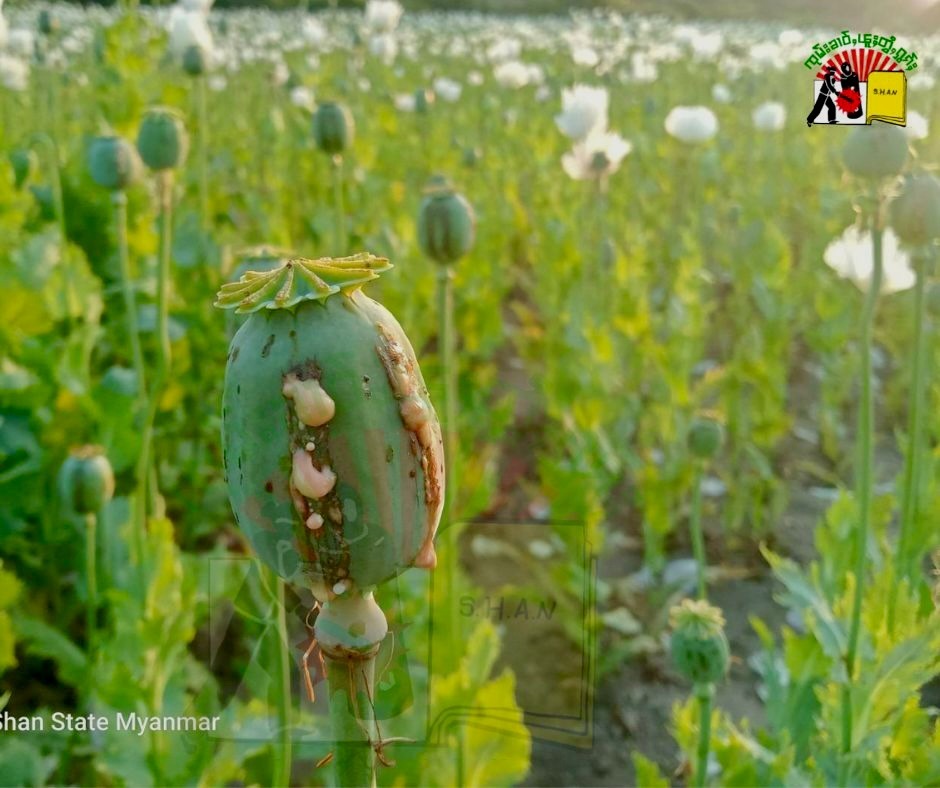
"Due to the presence of various ethnic armed forces in our area, we need to have money to pay the taxes they ask for. In the past, when we grew tea, we did not have to pay as much tax. But now we have to pay taxes to all groups," explained U Sai Sandi.
Poppy cultivation had decreased prior to the military coup, but with the return of political instability, poppy cultivation has seen a significant increase.
"Some ethnic armed forces purchase opium through intermediaries," shared U Sai Sandi based on his personal experience.
The United Nations Office on Drugs and Crime (UNODC) reports that the areas with the highest opium cultivation rates in Shan State, which are also known for a high presence of armed forces, include Hopong Township, Pinlaung Township, Pekon Township, Pinlon (Panglong) Township, Tangyan Township, Namtu Township, and eastern Shan State.
The drug monitoring group attributed the proliferation of opium plantations to the political turmoil resulting from the military coup and the high presence of armed forces in the area.
A Pa-O man in his 30s, who did not want to be named, said that there has been an increase in poppy cultivation in Hopong Township and Pinlaung Township, which are controlled by the Pa-O National Organization (PNO).
"On the mountains east of Hopong and near Pinlaung, opium is being widely cultivated again. Also, the current junta has turned a blind eye to this. As far as I know, the PNA militias are involved. There is a sense that if you can pay taxes, you can do it freely," said the Pa-O man.
According to the UNODC, Shan State is the largest producer of opium in Myanmar, and poppy cultivation has increased significantly since before, with a 39 percent increase in Shan State, a 14 percent increase in Chin State, an 11 percent increase in Kayah (Karenni) State, and a 3 percent increase in Kachin State.
The UNODC estimates that the amount of poppy cultivation has increased by an average of 41 percent in all states, with almost 10 kilograms of raw opium being produced per acre.
"The people who were known to be involved in drug trafficking before the military coup are now seen working with the military. It seems like the junta is turning a blind eye to it. Even some ethnic armed groups are also involved," the Pa-O man continued.
Sai Kham Phu, research manager of the Shan Drug Watch, stated that in Shan State, after the military coup, in addition to the original armed forces, various militia groups that stood by the Military Council also emerged, and opium cultivation has increased more than before.
"Shan State is a region with a high level of conflict between ethnic armed groups and the military. Most of the poppy growing areas are in areas with ethnic armed groups, as they need money to support their revolution. Unfortunately, growing poppies has become their only viable source of income. If they don't grow poppies, they won't have enough money to purchase weapons. Without these resources, they can't continue their revolution. Therefore, they feel they have no choice but to engage in poppy cultivation," explained Sai Kham Phu.
In addition, poppy cultivation has increased in Mongping Township and Kengtung (Kyaingtong) Township's western side, as well as in the boundary areas controlled by both the UWSA and the government. Additionally, methamphetamine production has also been on the rise
in the Thai-Myanmar border region.
According to UNODC's report, opium cultivation in Myanmar has been on the rise since the military coup, after a continuous decline from 2014 to 2020.
Sai Kham Phu pointed out that although the state budget and poppy transplant projects were initiated during the civilian government, there are difficulties in the market for the produced crops and long-term support for the farmers who planted the substitute crops.
"It is necessary to give priority to multi-faceted rural development in poppy-growing areas, and we must develop the local market of transplanting businesses. This is the only way farmers can reduce poppy cultivation. But as long as armed conflicts persist in these regions, these poppy cultivations will still exist," said Sai Kham Phu.
According to Sai Kham Phu, militias and ethnic armed groups operating in Shan State, which has long been plagued by civil war, are either directly or indirectly involved in opium cultivation and drug production.
Since most poppy growing areas are situated in mountainous areas, cultivating alternative crops in these regions can pose significant transportation challenges and may result in
limited market access and lower prices. This can make it difficult for families to sustain their livelihoods.
As a result, many locals in these areas rely on opium cultivation as their main source of income due to its ease of transportation and higher market value compared to alternative crops.
The government aimed to reduce and eliminate opium cultivation and carried out the opium replacement crop cultivation project from 1976 to 2014 with the support of the United Nations, but according to the report titled 'Bouncing Back Relapse in the Golden Triangle' published by the Transnational Institute (TNI) in 2014, it was written that the opium eradication projects were not successful.
UNODC has emphasized that improving the socio-economic conditions of communities and promoting sustainable rural livelihoods can be effective in reducing opium cultivation in the long term, as part of a broader strategy to address this issue.
Currently, many farmers who wish to transition away from the opium cultivation network are eager to pursue alternative and legitimate occupations. However, according to the Shan people, the lack of market success for poppy substitute crops remains a hindrance.
On the other hand, U Sai Sandi expressed his opinion that as long as political and military instability persists, opium cultivation will continue to flourish. He emphasizes the need for sustainable peace in the country, as well as a market for poppy substitute crops and improved transportation infrastructure to effectively address this issue.
"Improving transportation infrastructure is crucial to reducing opium cultivation. If there is political stability and a market that offers fair prices for alternative crops, farmers will undoubtedly abandon poppy cultivation," explained U Sai Sandi.

